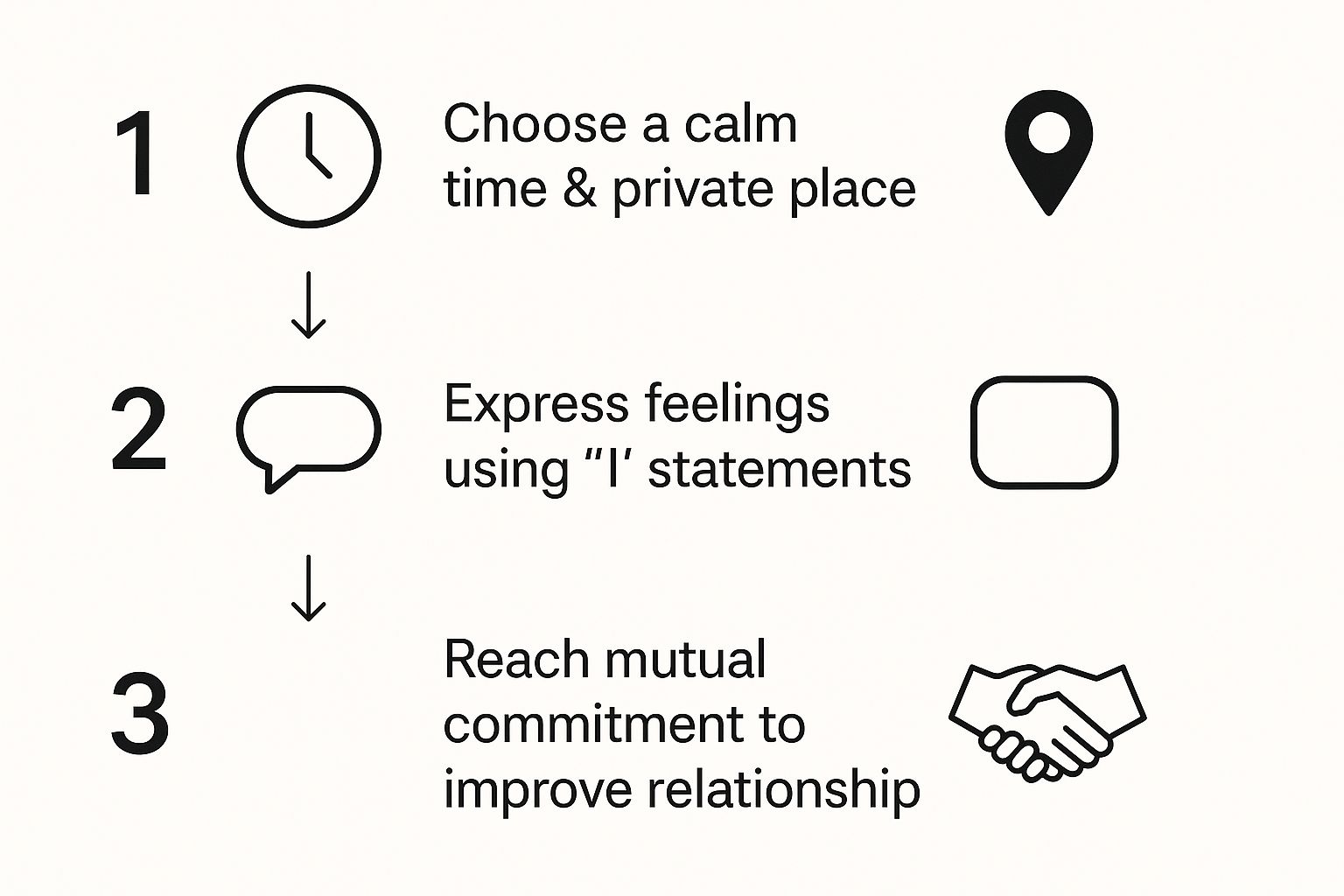How to Fix a Broken Relationship and Reconnect
- Therapy-with-Ben
- Oct 20
- 14 min read
Author: Therapy-with-Ben
If you're wondering how to fix a broken relationship, it starts with a simple, yet incredibly difficult, first step: understanding what actually broke. From there, it's about honest conversation and rebuilding trust, one small, positive action at a time. This isn’t a quick fix; it’s a process that demands honesty, patience, and a shared commitment from both of you to heal what’s been hurt and find your way back to each other.
Why Relationships Falter and How to Spot the Signs

Before you can even think about mending things, you have to get brutally honest about where the cracks are. It’s easy to fall back on vague clichés like “we just grew apart,” but that phrase is often a smokescreen for deeper, more specific problems that have been quietly chipping away at your connection for months, or even years.
This isn’t about pointing fingers. It's about gaining enough clarity to start the healing process with a real sense of direction and compassion for one another. The path to fixing what's broken begins by noticing the subtle, often unspoken, patterns that pulled you apart in the first place. It's almost never one big explosion, but rather a slow burn of small, unresolved moments that build up and create that painful emotional distance.
The Slow Erosion of Connection
Imagine the foundation of your relationship is a stone path. A single crack is easy enough to step over, but after a while, hundreds of tiny, neglected fissures can make the whole thing unstable. These fissures usually show up as subtle shifts in your day-to-day interactions—the kind of things that are easy to brush off at the time.
For instance, maybe you’ve stopped sharing the little things about your day. What used to be an animated chat about a frustrating meeting or a funny thing a colleague said has dwindled into a flat, one-word answer. This slow fade of daily intimacy is a huge red flag that emotional walls are going up.
Another classic pattern I see is when curiosity is replaced by assumption. Instead of asking, "What’s on your mind?", partners start thinking they already know. This almost always leads to misunderstandings, leaving both people feeling completely unheard and unseen.
In my practice, I often work with couples who have stopped turning towards each other. They share a house, a bed, maybe even a bank account, but they're no longer truly present. That shift from a team—a 'we'—to just 'me and you' coexisting is the first, crucial thing to acknowledge.
Unmet Needs and Unresolved Conflicts
At our core, we all have fundamental emotional needs: for affection, for validation, for security, for a sense of partnership. When those needs go consistently unmet, resentment starts to build up under the surface, quietly poisoning the well.
You'll often see the symptoms of this before you recognise the cause:
Constant Criticism: One person seems to find fault in everything the other does. Often, these little jabs are a way of voicing a much deeper dissatisfaction.
Defensiveness: Every conversation feels like a potential argument. You both feel attacked, so you immediately put up your defences instead of actually listening.
Emotional Shutdown: One or both of you just disengage during a disagreement. This is often called 'stonewalling', and it creates a brick wall right in the middle of your relationship, making any kind of resolution impossible.
These behaviours are almost always a sign of something bigger. While infidelity gets a lot of attention, a recent report highlighted that 'growing apart' and a 'lack of communication' were also massive factors in relationship breakdowns. The 2025 UK divorce report shows just how damaging this slow decay of connection and poor dialogue can be, accounting for a huge number of splits.
The first step isn't to fix it all at once. It's simply to acknowledge these patterns, without judgement. That's your starting line for genuine repair.
Starting the Conversation About What's Broken
Every journey of repair starts with a single, brave conversation. It’s that moment you finally admit, out loud, that something isn't right. This is the first domino that has to fall for anything else to change, but my goodness, can it feel terrifying.
The secret is to approach it with care, aiming to connect, not to confront.
Timing is everything. Seriously. Don't ambush your partner when they walk in the door after a nightmare day at work, and don't try to unpack years of baggage when you're both half-asleep. That's just setting yourselves up to fail. Instead, you have to be intentional. Find a quiet moment when you’re both relatively calm and won't be interrupted. Doing this one small thing shows them you respect them and you're serious about your relationship's health.
Framing the Conversation with 'I' Statements
Once you're talking, the words you choose will either build a bridge or a wall. The most effective tool I've seen in my practice is the simple 'I' statement. It’s a game-changer.
This approach flips the script from blame ("You never listen to me") to your own personal feeling ("I feel unheard when..."). It's a way of sharing your truth without immediately putting your partner on the defensive, which is usually what shuts these conversations down before they even begin.
This infographic lays out the basic flow for getting a productive conversation off the ground.

As you can see, it all comes down to creating a feeling of safety and sharing your own experience. The goal is to get to a place where you're both committed to making a change.
Here are a few gentle conversation starters you can make your own:
"I've been feeling a bit distant from you recently, and I really miss feeling close. I’d love it if we could find some time to talk about that."
"It makes me feel sad when we have the same argument over and over. I want us to feel like a team again, and I was hoping we could explore that together."
"This isn't about pointing fingers, but I've been feeling quite lonely in our relationship lately. What we have is so important to me, and I want to work on feeling connected again."
The point of this first chat isn't to solve everything in one go. Far from it. The goal is simply to get on the same page—to agree that things aren't working and, most importantly, to agree that your relationship is worth the effort to fix.
Even if you do everything right, your partner might still be surprised, defensive, or even deny there's a problem. If that happens, do your best to stay calm. Acknowledge what they're feeling ("I can see this is hard to hear") and gently bring it back to your desire to work together. This conversation is the first, essential step towards rebuilding what you've lost.
Learning to Communicate and Connect Again

So, you’ve opened the door with that first, difficult conversation. That’s a massive step. But the real work of reconnection is just beginning, and it’s powered by meaningful communication. This is where you learn to truly hear one another again, breaking free from the painful, worn-out scripts that have defined your arguments for far too long.
Many couples I work with tell me they communicate, but when we dig a little deeper, it becomes clear they’re just waiting for their turn to speak. They hear the words, but they miss the emotion and the need underneath. Often, learning how to fix a broken relationship means completely relearning how to listen.
Mastering the Art of Active Listening
Active listening is the difference between simply hearing sounds and truly understanding the message. It's a skill, and like any skill, it takes practice. But it’s one that builds incredible empathy and validation, showing your partner that what they feel matters to you, even if you don’t see things the same way in that moment.
The goal here is to stop formulating your rebuttal while they're talking. Your only job is to listen. Try to step into their world for a moment. What are they really saying? What’s the feeling driving the words?
A simple yet profound technique is to reflect back what you’ve heard. When they pause, you could offer something like, "Okay, so if I'm getting this right, you feel completely exhausted and unappreciated when I don't help tidy up. Have I got that right?" This little step does two crucial things: it confirms you've understood correctly, and it makes your partner feel genuinely seen and heard.
For a deeper dive into these kinds of techniques, our guide on how to communicate better in relationships has some valuable insights.
Moving from Destructive Habits to Constructive Dialogue
Over time, it's easy for couples to fall into communication shortcuts, and many of them are incredibly destructive. Relationship researcher Dr John Gottman famously identified what he calls the "Four Horsemen" of the relationship apocalypse: criticism, contempt, defensiveness, and stonewalling. Spotting these patterns in your own dynamic is the first, essential step towards changing them.
The goal isn't to never disagree. It's to learn how to handle disagreements in a way that brings you closer, rather than pushing you further apart. Every successfully navigated conflict can actually build intimacy.
To make this practical, it helps to see a direct comparison between the habits that tear a relationship down and the ones that build it back up.
Destructive vs Constructive Communication Patterns
We all slip into bad habits, especially when we're stressed or hurt. But recognising a destructive pattern is the first step toward consciously choosing a more constructive one. This table shows you what to swap out.
Destructive Habit (What to Avoid) | Constructive Alternative (What to Do Instead) | Example |
|---|---|---|
Criticism & Blame: Attacking your partner's character. | Use 'I' Statements: Focus on your own feelings and needs. | Instead of "You never think about me," try "I feel hurt and forgotten when plans change without us talking about it first." |
Contempt: Sarcasm, eye-rolling, or mocking. | Show Appreciation: Express respect and gratitude, even during conflict. | Instead of scoffing, try saying, "I know you're stressed, and I appreciate that you're trying. Can we find a better way?" |
Defensiveness: Making excuses or seeing yourself as the victim. | Take Responsibility: Acknowledge your part in the problem, no matter how small. |
Seeing the patterns laid out like this can be a real eye-opener. The shift from blame to personal feeling, from contempt to appreciation, is what turns a fight into a conversation.
A Practical Exercise: The 'State of the Union' Meeting
To build a dedicated space for this new kind of communication, I often recommend couples schedule a weekly ‘State of the Union’ meeting. It’s not as formal or daunting as it sounds! It's simply 20-30 minutes set aside each week to check in with each other, completely free from distractions like phones or the telly.
Use this time to talk about what went well that week, what felt challenging, and what you appreciate about one another. This creates a safe, contained moment to practise active listening and constructive dialogue, helping to transform your daily interactions from potential minefields into real opportunities for connection.
The Slow, Steady Work of Rebuilding Trust
When communication fails, trust is nearly always the first casualty. Getting it back isn’t about grand gestures or a single, perfect apology. It's a quiet, slow-burn process that is built entirely on consistent action, not just words. Promises are a start, of course, but they ring hollow without a new pattern of trustworthy behaviour to give them weight.
It doesn’t matter if the trust was shattered in one explosive moment or slowly worn away by a thousand tiny disappointments—the path back is always the same. It demands unwavering consistency, remorse that your partner can actually feel, and a genuine commitment to transparency. You're not trying to erase the past. Instead, you're painstakingly laying down a new track record, one reliable action at a time, showing your partner that you can be their safe harbour once again.
The Bedrock: Consistency and Transparency
At its core, trust is just a belief in someone's reliability. To rebuild it, you have to become the most dependable person your partner knows. This means doing what you say you’re going to do, every single time, no matter how small it seems.
If you say you’ll call at 3 PM, you call at 3 PM. If you promise to handle a chore, you see it through without needing a reminder. These small, steady actions are the bricks you use to build a new foundation. Each fulfilled promise is like a tiny deposit into a severely overdrawn trust account. It feels slow because it is slow. There are no shortcuts here.
Transparency is the other side of this coin. For the person who has been hurt, the unknown is terrifying. It’s a breeding ground for suspicion and fear. To fight this, you have to be willing to be an open book for a while. This might mean being open with your phone, clear about where you are, or answering tough questions without getting defensive. This isn't about being controlled; it's about voluntarily removing all doubt until your partner feels safe again. We have more practical guidance on this in our post about how to build trust in relationships and proven tips.
The Heart of the Matter: Genuine Remorse and Patience
For trust to really take root again, the person who was hurt needs to feel—deep in their gut—that you understand the pain you caused. This goes so far beyond a simple "I'm sorry."
Genuine remorse looks like this:
Owning the hurt: You have to name the specific pain you caused, without tacking on a "but..." or any other excuse.
Listening without getting defensive: Let your partner be angry. Let them be hurt. Let them repeat themselves. Just listen, without trying to justify what you did.
Truly showing empathy: Make the effort to see it from their side and let them know that their feelings make sense.
This whole process requires an incredible amount of patience from both of you. The person who broke the trust must be patient as their partner heals. And the person who was hurt must be patient with their own lingering feelings of anger and suspicion.
Rebuilding trust is a marathon, not a sprint. You are proving, through a long series of new experiences, that you are who you say you are today, not the person who caused the hurt yesterday.
It’s interesting to see that while this work is incredibly challenging, more couples seem to be choosing to work through their issues. In the UK, divorce rates have actually dropped significantly. There were 80,057 divorces in England and Wales in 2022, which is a 30% decrease from the year before and the lowest figure in over 50 years. This is partly due to new no-fault divorce laws that require a waiting period, giving couples more time to reflect. This data suggests a real shift towards repair over separation, reinforcing the idea that mending a broken relationship is a goal worth fighting for.
Deciding to Bring in Professional Support

Sometimes, no matter how hard you try, you hit a wall. You find yourselves having the same argument over and over, a frustrating loop that never seems to resolve anything. Or perhaps a silence has grown between you, a gap that feels too wide to cross on your own.
Recognising this point isn't a failure. Far from it. It's a moment of profound strength, an honest admission that your usual ways of fixing things just aren't cutting it anymore.
Making the call to bring in a professional is one of the most powerful things you can do for your relationship. It’s an investment in your future together, a way of saying, "This is too important to give up on." It's about getting unstuck.
What Couples Counselling is Really Like
I get it. The thought of sitting down with a stranger to talk about your most private issues can feel incredibly intimidating. Lots of couples I see worry they’ll be judged, or that one person will be singled out as ‘the problem’.
Let me put those fears to rest. A good therapist isn't a referee there to pick a winner. Their job is to act as a guide, helping you both see the unhelpful patterns you’re caught in and giving you practical tools to break free. It’s about creating a safe, neutral space where you can finally say what you need to say and, crucially, feel properly heard.
Seeking professional support is not an admission of defeat. It's a declaration that your relationship is worth fighting for and that you're willing to learn new skills to do it effectively.
Finding the Right Therapist for You Both
The relationship you build with your therapist is fundamental. If you don't click, it's just not going to work. You both need to feel comfortable with and trust the person in that room with you.
Taking that first step can feel a bit overwhelming, so I've put together a guide on how to find a therapist in the UK that walks you through the process.
When you're looking, it helps to keep a few things in mind:
Their Approach: Therapists work in different ways. Some use Emotionally Focused Therapy (EFT) to strengthen your emotional bond, while others might use Cognitive Behavioural Therapy (CBT) to tackle specific thought patterns.
The Practical Stuff: Be realistic about what you can afford and when you can both make sessions. Many therapists, myself included, offer both online and in-person appointments to make it easier.
Have a 'Test Run': Don't feel pressured to commit after one chat. It's perfectly okay to have an initial consultation with a couple of different therapists to see who feels like the best fit.
It's interesting to see when these challenges often peak. Data from the Office for National Statistics shows that nearly a quarter of married couples divorce before their ninth anniversary. This suggests a really critical window where learning better communication and connection skills with a professional could genuinely change the course of a relationship.
Common Questions About Mending a Relationship
When you’re in the thick of trying to repair a relationship, it’s completely normal for worries and specific questions to pop up. This path is often full of uncertainty, so getting some straight answers can feel like a lifeline.
Let's walk through some of the most common concerns I hear from the couples I work with. The hope is to give you a bit of practical clarity as you start the tough, but worthwhile, journey back to each other.
Can a Relationship Truly Recover After Trust Is Broken?
Yes, it absolutely can. But I won't sugar-coat it: it takes an incredible, sustained commitment from both of you. Healing doesn't just happen on its own; it’s an active, daily choice to do the hard work.
For the partner who broke the trust, the way forward is all about showing genuine remorse and, crucially, behaving in a transparent and consistent way over the long haul. For the one who was hurt, it means finding the courage, eventually, to risk trusting again. It’s a slow, painstaking process built on new actions, not just words and old promises. This is where couples counselling can be invaluable, providing a safe space to guide you both.
Rebuilding isn’t about trying to forget what happened. It's about creating so many new, positive, and trustworthy experiences that they eventually start to outweigh the pain of the past. It’s about proving with your actions today that you are a safe partner for the future.
How Long Does It Take to Fix a Broken Relationship?
There’s no magic number here. Every couple, and every fracture, is different. The timeline really depends on how deep the issues run and, more than anything, how dedicated both people are to the repair work.
A few things can influence how long it takes:
The nature of the breach: Small rifts caused by a misunderstanding might be patched up in a few weeks.
The depth of the betrayal: A major betrayal like infidelity can understandably take years to truly heal from.
The level of commitment: The pace is really set by how consistently you both put new communication and connection skills into practice.
Honestly, it’s much healthier to focus on making steady, consistent progress rather than aiming for a specific deadline. The real goal is lasting, meaningful change, not a quick fix that won't hold. Trying to rush forgiveness almost always backfires.
What if Only One Person Wants to Fix Things?
This is easily one of the most painful situations to be in. Real relationship repair has to be a team effort; you simply can't drag your partner to the finish line if they don't want to run the race.
But you can always control your own actions. By focusing on your own growth—perhaps through individual therapy—you can sharpen your communication skills and get a clearer picture of your own part in the relationship's dynamics. Sometimes, seeing one person make positive, consistent changes can inspire the other to re-engage. It’s not a guarantee, but it can happen.
Ultimately, the focus should be on becoming a healthier, more self-aware person. That work is incredibly valuable for your own well-being, whether the relationship makes it or not. It ensures you’re growing, and that’s a win no matter what the future holds.
At Therapy with Ben, I provide a supportive, non-judgemental space for individuals and couples to navigate these challenges. Whether you're looking to rebuild your relationship or find clarity on your own path forward, I'm here to help. You can learn more and book a session at https://www.therapy-with-ben.co.uk.

.jpg)

Comments